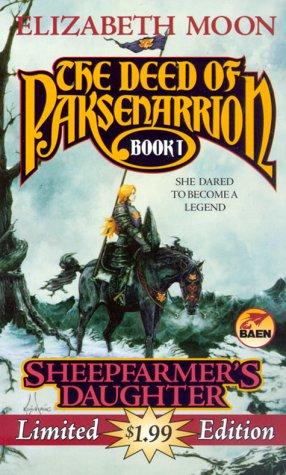Review of "Sheepfarmer's Daughter (The Deed of Paksenarrion, Book 1)" on 'Goodreads'
5 stars
The Sheepfarmer is Paksenarrion's father Dorthan, and a nasty character indeed. Paks wants nothing of his plans to sell her into virtual slavery, and so escapes and goes to join one of the few mercenary groups - a Company - who accept female soldiers.
So begin the Deed of Paksenarrion, the first in a three-book trilogy by Elizabeth Moon; one of few authors who manage to keep fantasy trilogies at, yes, three books.
This is military-fantasy, which implies battles, death, war, and suffering. It should come as no surprise, then, that there are battles, death, and so forth - even so, reading reviews of this book, it would appear that many write opinions without first reading the story.
First, the language is easily read. It is not dumbed down; it is easy, not simplistic. The Saga style of either [a:Snorre] or Tolkien, different as they are, may not be expected …
The Sheepfarmer is Paksenarrion's father Dorthan, and a nasty character indeed. Paks wants nothing of his plans to sell her into virtual slavery, and so escapes and goes to join one of the few mercenary groups - a Company - who accept female soldiers.
So begin the Deed of Paksenarrion, the first in a three-book trilogy by Elizabeth Moon; one of few authors who manage to keep fantasy trilogies at, yes, three books.
This is military-fantasy, which implies battles, death, war, and suffering. It should come as no surprise, then, that there are battles, death, and so forth - even so, reading reviews of this book, it would appear that many write opinions without first reading the story.
First, the language is easily read. It is not dumbed down; it is easy, not simplistic. The Saga style of either [a:Snorre] or Tolkien, different as they are, may not be expected here. Some, very minimal, repetition is evident. It is not a distraction.
The setting is a fantasy classic: inspired by the middle ages, somewhat brighter than our own, with a dash of roman, a touch of magic, an elf or two, and the occasional wandering dwarf.
In the tradition of "Das Boot", it is also written to be realistic from the point of view of the sword-fodder in the first ranks. What you see, is what Paks see - the mud, the fatigue, the food, the face of the enemy in front. There's few eagle-eye views here, very little in the way of inspired, brilliant tactics from the lowly footsoldier. For a long time she go where she is told, and fight whom she is directed to fight. It changes as book progress; her view of politics and of warn becoming ever so slowly more refined.
Her character evolve as well - equally slowly. The book take place of a mere three years, and it is a very different Paksenarrion at the end - with a few more scars, a few more bruises, and a few more aches in her heart for lost friends.
For the rest I suggest Elizabeth Moon's own remarks in the wikipedia article.
Finally, since I DID make the mistake of reading other reviews: there IS sexism in the book, there are no elves flying to the rescue, there is quite a different set of angles than in most "high" fantasy; there is no "one true god" ... in short, people, READ the book before reviewing.

